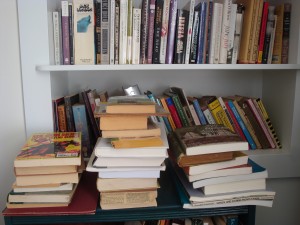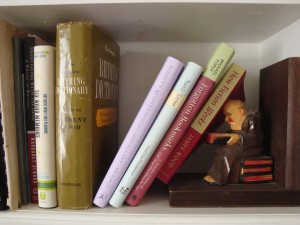I read for pleasure, information, adventure, enlightenment and inspiration. I read other writers who are writing in the same genre as myself, usually the personal essay, to keep up my energy and try to understand what I’m doing. Reading is an unending source of nutrients. When someone recommends a book – and I like it – it’s the best present I could receive. A friend recently suggested Dangerous Laughter: Thirteen Stories, and now I’m ready to read everything written by Steven Millhauser. I enjoyed the same feast years ago when I discovered Robertson Davies and Carol Shields. I could read The Stone Diaries again and again except that now, waiting for me, there are new discoveries: Out Stealing Horses, The Library at Night, Travels with Herodotus, and on and on. Barbara Holland says in Endangered Pleasures, “ [books] move permanently into one’s head and construct their own space there, a kind of walled garden full of tame dragons that we can walk around in whenever we want.”
Love of books and stories bubbled up through my family. I remember my father reading the Encyclopedia Britannica throughout my childhood; he was never put off by an obscure or dry subject. As we sat in the living room together in the evening, whatever we were doing separately was punctuated by enthusiastic yelps from dad, like, “Listen to this! You’ve got to hear this,” and he would read aloud about an explanation of mitosis or yet another lost tribe. At bedtime, he would spin a new rendition of Brer Rabbit and Reddy Fox as my brothers and I pulled the blankets up to our chins and visualized the hapless predator and clever hare in yet another scenario. Cousin Muriel wrote and published a book at the age of ninety-two after a lifetime of voracious reading. She claimed she couldn’t get her book out sooner because she was too busy reading.
I learned to read around age three, cradling a book on my lap, sitting in front of my grandmother who pronounced and explained words as she glanced over my shoulder while braiding my hair every morning. I kept diaries, but often ripped out the pages for fear my nosy brothers would read them. I would never have the courage of Louisa May Alcott who said: “We read each other’s diaries in our family and wrote notes to each other in them.”
There was no public library in my hometown, but our house was full of books. Among them the Complete Works of Shakespeare, the My Book House series, Robert Lewis Stevenson, my mother’s text books from nursing school, Mark Twain, Herman Melville, Charles Dickens, various dusty Victorian novels and romantic poets, and a series called, Great Men and Famous Women published in 1893. Visitors carried a stream of books into our house, like Father Shea, who frequently appeared at suppertime bearing Holy Water for our various ills and books for our brains. He blessed me with a complete set of Lives of the Saints, in which I discovered Saint Damien whose lifelong work with Lepers in a far off place seemed titillating to a curious, sheltered ten-year-old.
I didn’t discover libraries and the mystery and delight of borrowing books until Junior High School. At age twelve, the first book I bought in a bookstore was Stuart Little by E.B. White. It spoke to me because it was a delightful metaphor for my life. My youngest brother never grew to be a normal child. He remained an invalid at home until he died at age seven when I was fourteen. My life with an unusual sibling didn’t seem so abnormal relative to one whose brother was a mouse with a car and a sail boat. As Ralph Waldo Emerson said, “the best books impress us with the conviction, that one nature wrote and the same reads.”
When the only store in our town began to sell paperback books, I discovered a new world of reading. Here was Martin Buber, Eldridge Cleaver, James Baldwin, James Mitchner and others, all consorting in the same wire turnstile, waiting for me just a block from home. Between my High School Library and purchases off the rack at William’s General Store, I binged on books as a teenager.
Fifteen years ago, the poetry of Kevin Bowen, especially Playing Basketball with the Viet Cong, inspired me to write a play about my husband’s death in Vietnam. The play evolved into a memoir as I worked to understand my personal transformation as a result of the event. Researching and memorizing the poetry of Emily Dickinson led me to Louisa May Alcott and inspired a play about Louisa’s life as a writer, The Secret Life of Louisa May Alcott. To find her voice, I read the writers she admired; Emerson, Thoreau, Wordsworth, Milton, Charlotte and Emily Bronte.
Writer friends are lifelong, even if we never meet in the flesh. They intermingle with all the other book-born people we encounter. I have never regretted a moment with Grace Paley, Fay Weldon, Graham Greene, Harold Pinter, May Sarton, Rita Mae Brown, Eudora Welty, John Cheever, Paul Auster, Patricia Hampl, Francine Prose, Raymond Carver, Alan Bennett, Anton Chekhov, George Eliot, E.M. Forster, Proust, Montaigne, J. R. Ackerly, or Shakespeare.
The closer I read, the more I learn about writing, and the generosity of thoughtful companions in the world of books.
You can find more thoughts about writing and reading at www.Facebook.com/ruthwcrockerauthor.



